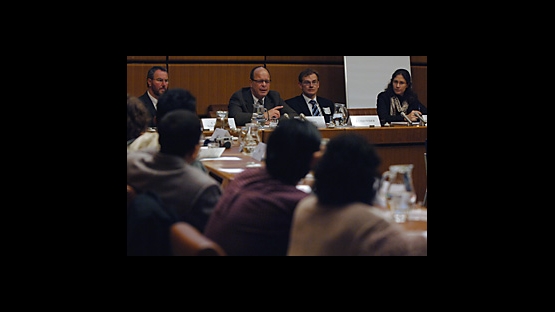Scientists from around the world are being trained by the Joint FAO/IAEA Division of Nuclear Techniques in Food and Agriculture (NAFA) to accurately analyse the level of pesticide residue in food produced in their countries.
The presence of pesticides in food and the environment may affect human health and create barriers to trade in agricultural produce. Current international agreements require that the pesticide residue content of foods being traded on the international market are certified by labs that implement appropriate quality control and quality assurance systems.
Within this context NAFA is training scientists employed by government-run/state utilised labs in quality assurance and control measures as it relates to pesticide residue analysis. These workshops have been an annual event for more than a decade.
Addressing participants during the opening day of the latest workshop, David Byron, Head of the NAFA Food and Environmental Protection Section at the IAEA said, "What we´re aiming for is to improve consumer protection, while at the same time facilitating international trade."
NAFA zeroes in on training scientists because analytical laboratories play an integral part in the application of good agricultural practice through verification of the quality of agricultural goods both in and outside national borders. Labs may also provide information and advice to farmers and producers, either directly or through extension services.
The core training takes place at the IAEA laboratories in Seibersdorf in Vienna, Austria. "For this workshop, part of the training will be in the use of radioisotopes in the development of analytical methodology for pesticide residues. Those techniques will be used in conjunction with conventional analytical techniques. The idea is that the use of radio tracers gives a comparative advantage in the development and validation of those methods," said Andrew Cannavan, Head of the Agrochemicals Unit of the FAO/IAEA Agriculture and Biotechnology Laboratory.
Participants will be exposed to issues of sampling, quality control of lab operations, statistical treatment and interpretation of analytical results and laboratory accreditation, equivalence of food control procedures and mutual recognition.
Britt Maestroni, NAFA Training Officer, said that since the workshops started more than 10 years ago, there have been favourable results. "I think our work is quite effective. In some of the countries, the awareness has been raised, control programmes are in place, and enforcement programmes are in place. Some of the labs have been accredited, so they are able to produce very good quality data."
More than 200 scientists from developing countries have been trained since the project began in the late 1990s. This year, 21 scientists from Afghanistan, Bolivia, Bosnia, Colombia, Costa Rica, Dominica, Ghana, Kenya, the Republic of Korea, Malaysia, Malta, Nepal, Paraguay, Senegal, Slovenia, South Africa, Tanzania, Thailand, Tunisia, Yemen and Zambia are participating in the practical and theoretical training workshop, which runs from 13 October to 7 November 2008.


